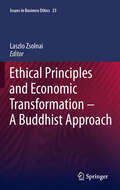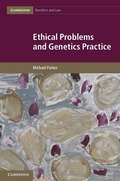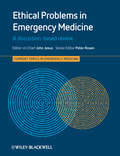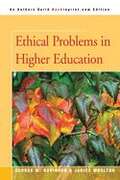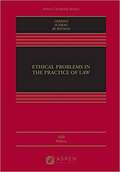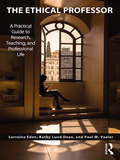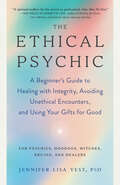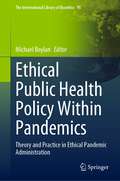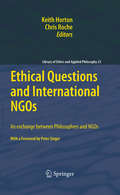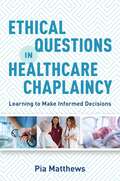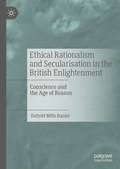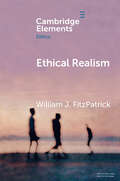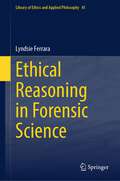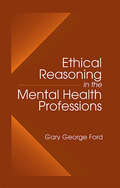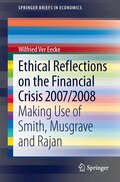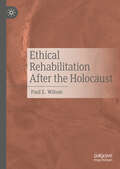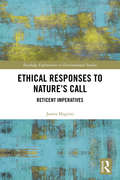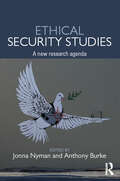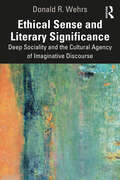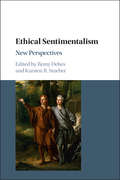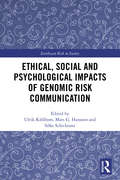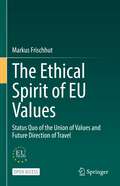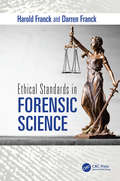- Table View
- List View
Ethical Principles and Economic Transformation - A Buddhist Approach
by Laszlo ZsolnaiBuddhism points out that emphasizing individuality and promoting the greatest fulfillment of the desires of the individual conjointly lead to destruction. The book promotes the basic value-choices of Buddhism, namely happiness, peace and permanence. Happiness research convincingly shows that not material wealth but the richness of personal relationships determines happiness. Not things, but people make people happy. Western economics tries to provide people with happiness by supplying enormous quantities of things and today's dominating business models are based on and cultivates narrow self-centeredness.But what people need are caring relationships and generosity. Buddhist economics makes these values accessible by direct provision. Peace can be achieved in nonviolent ways. Wanting less can substantially contribute to this endeavor and make it happen more easily. Permanence, or ecological sustainability, requires a drastic cutback in the present level of consumption and production globally. This reduction should not be an inconvenient exercise of self-sacrifice. In the noble ethos of reducing suffering it can be a positive development path for humanity.
Ethical Problems and Genetics Practice
by Michael ParkerEthical Problems and Genetics Practice provides a rich, case-based account of the ethical issues arising in the genetics clinic and laboratory. By analysing a wide range of evocative and often arresting cases from practice, Michael Parker provides a compelling insight into the complex moral world of the contemporary genetics professional and the challenges they face in the care of patients and their families. This book is essential reading for anyone interested in the ethical issues arising in everyday genetics practice. Ethical Problems and Genetics Practice is also a sustained engagement with the relationships between bioethics and social science. In proposing and exemplifying a new approach to bioethics, it makes a significant contribution to debates on methods and interdisciplinarity and will therefore also appeal to all those concerned with theoretical and methodological approaches to bioethics and social science.
Ethical Problems in Emergency Medicine
by John Jesus Peter Rosen James G. Adams Arthur R. Derse Shamai A. Grossman Richard WolfeThis book is designed to consolidate the relevant literature as well as the thoughts of professionals currently working in the field into a practical and accessible reference for the emergency medical technician, student, nurse, resident, and attending emergency physician. Each chapter is divided into four sections: case presentation, discussion, review of the current literature, and recommendations. Designed to serve simultaneously as a learning and reference tool, each chapter begins with a real case that was encountered in an ED setting. The case presentation is followed by a short discussion of the case, as if at a morbidity and mortality conference, by a panel of experienced attending physicians explaining how they would approach the ethical dilemmas associated with the case, and a review of the existing literature.
Ethical Problems in Higher Education
by George M. Robinson Janice MoultonThe Ivory Tower Myth suggests that the world of higher education has no moral problems. Unlike ethical conflicts in business, politics and medicine, ethical problems in higher education receive little publicity. But devotion to the pursuit of knowledge does not ensure ethical behavior. Power, competition, pressure and lust for recognition create moral conflicts. Some are unique to higher education but many are common to the world off-campus. <p><p> This book uses ethical theories as a tool to analyze real examples from our colleges and universities. Topics include: academic freedom, plagiarism, cheating, research fraud, equal opportunity, evaluation, tenure, student-faculty relationships.
Ethical Problems In The Practice Of Law (Aspen Casebook Series)
by Lisa G. Lerman Philip G. Schrag Robert RubinsonThis problem-based book reflects the authors' broad range of teaching, clinical, and policy-making experience. Ethical Problems in the Practice of Law's carefully crafted ethical problems challenge students to engage in a deep analysis and participate in lively class discussion. New to the Fifth Edition: Comprehensive updates to reflect the many new developments in this fast-moving field. The authors carefully revised the entire text, adding six new problems and countless new case examples to illustrate the operation of "lawyer law." Expanded coverage of ethics issues for arbitrators and mediators. Expanded coverage of the ethical challenges and pitfalls faced by lawyers in light of advancing technology. Deeper discussion of issues of diversity and discrimination in the legal profession. Updated and enhanced materials on innovations and transformations in the legal profession and the regulation of lawyers in the United States and abroad, including innovation in financing law practice and litigation, and offshoring legal work. Additional material on continuing efforts to address the unmet need for legal services, including licensing of nonlawyers to provide limited legal services. Professors and students will benefit from: Real-world problems, most based on actual cases, in which students are asked to step into the shoes of practicing lawyers to confront difficult ethical dilemmas that often arise in the early years of law practice. Problem-based approach, often based on real-life cases, offers students a practical way to test their understanding Problem method engages students and generates class discussion, because most problems present head-scratching dilemmas that students must puzzle through together Graphics (cartoons, tables, photos) throughout, which make the presentation lively and engaging Clear expositions of the law allow professors to devote the majority of class time to interactive discussion of the problems Transformation of a course from an often-boring upper-class requirement to a learning environment that is educationally rich, engaging and fun Shocking examples of recent lawyer misconduct maintain student interest A readable and enjoyable law school textbook
Ethical Problems in the Practice of Law: Concise Edition
by Lisa G. Lerman Philip G. SchragThis book is an introduction to the law that governs lawyers. It includes two chapters on some important aspects of the legal profession.
The Ethical Professor: A Practical Guide to Research, Teaching and Professional Life
by Lorraine Eden Kathy Lund Dean Paul M VaalerThe purpose of The Ethical Professor is to provide a road map to some of the ethical dilemmas that doctoral students and newer faculty members are likely to face as they enter a career in academia (the Academy). Academic career paths appear to be quite standard, transparent, and achievable with dedicated and hard work. Argued in this book, however, is that the road map to a successful academic career is not so easy. There are ethical pitfalls along the way, starting with entry into academia as a new PhD student. These ethical dilemmas remain equally opaque as faculty progress in their careers. The ethical pitfalls that plague each of the steps along the academic career path are often not visible to doctoral students and young faculty members; nor are they well prepared to spot them. Ethical issues are seldom discussed and little training is provided on how to spot and handle these potential road blocks to a successful career in the academy. Based on extant research and collective years of academic experience, The Ethical Professor seeks to shorten the learning curve around common ethical pitfalls and issues by defining them, sharing research and experiences about them, and offering a discussion framework for continued learning and reflection. This innovative new volume will be key reading for doctoral students and junior faculty members in social science departments in colleges and universities, as well as managers undertaking an MBA. Due to the increasing complexity of managing academic institutions, more seasoned professors, administrators, and college deans and presidents, will also benefit from the research presented here.
The Ethical Project
by Philip KitcherPrinciples of right and wrong guide the lives of almost all human beings, but we often see them as external to ourselves, outside our own control. In a revolutionary approach to the problems of moral philosophy, Philip Kitcher makes a provocative proposal: Instead of conceiving ethical commands as divine revelations or as the discoveries of brilliant thinkers, we should see our ethical practices as evolving over tens of thousands of years, as members of our species have worked out how to live together and prosper. Elaborating this radical new vision, Kitcher shows how the limited altruistic tendencies of our ancestors enabled a fragile social life, how our forebears learned to regulate their interactions with one another, and how human societies eventually grew into forms of previously unimaginable complexity. The most successful of the many millennia-old experiments in how to live, he contends, survive in our values today. Drawing on natural science, social science, and philosophy to develop an approach he calls "pragmatic naturalism," Kitcher reveals the power of an evolving ethics built around a few core principles-including justice and cooperation-but leaving room for a diversity of communities and modes of self-expression. Ethics emerges as a beautifully human phenomenon-permanently unfinished, collectively refined and distorted generation by generation. Our human values, Kitcher shows, can be understood not as a final system but as a project-the ethical project-in which our species has engaged for most of its history, and which has been central to who we are.
The Ethical Psychic: A Beginner's Guide to Healing with Integrity, Avoiding Unethical Encounters, and Using Your Gifts for Good
by Jennifer Lisa VestA 101 guide for psychics and energy workers to build an authentic, equitable, and culturally sensitive healing practice, written by Afro-Indigenous intuitive, scholar, and healer Dr. Jennifer Lisa Vest.Being an ethical psychic means being of service--and learning how to navigate the thorny issues and unique risks inherent to intuitive work. From knowing your boundaries and limitations--and respecting those of your clients--to resisting the temptation of the guru lifestyle, The Ethical Psychic offers 7 critical guiding principles for grounded, ethical practice. Intuitive, philosopher, and ethicist Dr. Jennifer Lisa Vest, PhD, explores why (and how) energy workers must be of service, authentic, and self-aware; learn from their mistakes; embody sensitivity to client needs; be humble; and listen to a higher source. With training in African American Hoodoo, Native American Sweatlodge, Jamaican Revivalism, Trinidadian Shango, Spiritualism, Reiki, Pranic Healing, and other traditions, Dr. Vest is uniquely positioned to address readers&’ most common and pressing questions, like: How do I avoid crossing boundaries? What if I&’m making things worse? What privacy considerations do I need to think about? How can I be financially ethical? How do I avoid appropriation? What do I need to know about working with spirits? A go-to-guide for any medium, spirit worker, psychic, or aspiring Reiki master, The Ethical Psychic helps readers become the grounded and effective healers they were born to be.
Ethical Public Health Policy Within Pandemics: Theory and Practice in Ethical Pandemic Administration (The International Library of Bioethics #95)
by Michael BoylanThis book contains original essays that look at contagious/infectious disease pandemics and the ethical public policy and administration these have entailed. In particular, the pandemics of the 1918 flu pandemic, HIV in the 1990s, SARS in 2003, Ebola from 2014–2016 and the novel COVID-19 in 2020 are highlighted. The contributions in this work offer the reader insights in these and several other recent pandemics that present differently—either via contagion or mortality rate—and how each should be addressed by countries of various sorts. This book is a must for the ongoing debate on how we should treat public health crises, such as the one we have all just encountered in the novel COVID-19 pandemic.
Ethical Questions and International NGOs
by Keith Horton Chris RocheIn recent decades there has been a great expansion in the number, size and influence of International Non-Governmental Organisations (INGOs) involved in international relief and development. These changes have led to increased scrutiny of such organisations, and this scrutiny, together with increasing reflection by INGOs themselves and their staff on their own practice, has helped to highlight a number of pressing ethical questions such organisations face, such as: should INGOs attempt to provide emergency assistance even when doing so risks helping to fuel further conflict? How should INGOs manage any differences between their values and those of the people they seek to benefit? How open and honest should INGOs be about their own uncertainties and failures? This book consists of sustained reflections on such questions. It derives from a workshop held at Melbourne University in July 2007 that brought together a group of people - for the most part, reflective practitioners and moral and political philosophers - to discuss such questions. It explores honestly some of the current challenges and dilemmas that INGOs face, and also suggests some new ideas for meeting these challenges. Our hope is that the kind of explicit reflection on the ethical issues INGOs face exemplified in this publication will help to promote a wider debate about these issues, a debate that in turn will help INGO managers and others to make better, wiser, more ethically informed decisions.
Ethical Questions in Healthcare Chaplaincy: Learning to Make Informed Decisions
by Pia MatthewsThis textbook untangles the complicated ethical dilemmas that arise during the day-to-day work of healthcare chaplaincy, and offers a sturdy but flexible framework which chaplains can use to reflect on their own practice. Tackling essential issues such as consent, life support, abortion, beginning and end of life and human dignity, it enables chaplains to tease out the ethical implications of situations they encounter, to educate themselves on relevant legal matters and to engage with different ethical viewpoints. The book combines case studies of familiar scenarios with thorough information on legal matters, while providing ample opportunity for workplace reflection and offering guidance as to how chaplains can best support patients and their families while preserving their own integrity and well-being. Clear, sensitive and user-friendly, this will be an indispensable resource for healthcare chaplains and all healthcare professionals interested in spiritual care.
Ethical Rationalism and Secularisation in the British Enlightenment: Conscience and the Age of Reason
by Dafydd Mills DanielThis book reassesses the ethics of reason in the Age of the Reason, making use of the neglected category of conscience. Arguing that conscience was a central feature of British Enlightenment ethical rationalism, the book explores the links between Enlightenment philosophy and modern secularisation, while responding to longstanding criticisms of rational intuitionism and the analogy between mathematics and morals, derived from David Hume and Immanuel Kant. Questioning in what sense British Enlightenment ethical rationalism can be associated with a secularising ‘Enlightenment project’, Daniel investigates the extent to which contemporary, and secular liberal, invocations of reason and conscience rely on the early modern Christian metaphysics they have otherwise disregarded. The chapters cover a rich collection of subjects, ranging from the Enlightenment’s secular legacy, reason and conscience in the history of ethics, and controversies in the Scottish Enlightenment, to the role of British moralists such as John Locke, Joseph Butler and Adam Smith in the secularisation of reason and conscience. Each chapter expertly refines Enlightenment ethical rationalism by reinterpreting its most influential proponents in eighteenth-century Britain – the followers of ‘Isaac Newton’s bulldog’ Samuel Clarke – including Richard Price (Edmund Burke’s opponent over the French Revolution) and John Witherspoon (the only clergyman to sign the US declaration of Independence).
Ethical Realism (Elements in Ethics)
by William J. FitzPatrickThis Element examines the many facets of ethical realism and the issues at stake in metaethical debates about it—both between realism and non-realist alternatives, and between different versions of realism itself. Starting with a minimal core characterization of ethical realism focused on claims about meaning and truth, we go on to develop a narrower and more theoretically useful conception by adding further claims about objectivity and ontological commitment. Yet even this common understanding of ethical realism captures a surprisingly heterogeneous range of views. In fact, a strong case can be made for adding several more conditions in order to arrive at a proper paradigm of realism about ethics when understood in a non-deflationary way. We then develop this more robust realism, bringing out its distinctive take on ethical objectivity and normative authority, its unique ontological commitments, and both the support for it and some challenges it faces.
Ethical Reasoning in Forensic Science (Library of Ethics and Applied Philosophy #41)
by Lyndsie FerraraThis book explores the impact of ethical reasoning in forensic science and demonstrates that it is in fact a foundational skill required by those engaged in the field. Forensic science is viewed as a mechanism to aid the criminal justice system in finding truth, but failures within the field contribute to the growing injustice facing society. The author recognizes these failings and brings a new perspective by establishing bioethical principles as a foundation for improving ethical reasoning skills. These skills are a critical component of forensic science education for upcoming professionals. While other books focus on egregious cases of ethical misconduct, this text highlights the daily decisions and issues that occur during the forensic investigation and analysis processes. It is written for future forensic professionals and forensic science educators, as well as those individuals already working in the forensic science field.
Ethical Reasoning in the Mental Health Professions
by Gary G. FordThe ability to reason ethically is an extraordinarily important aspect of professionalism in any field. Indeed, the greatest challenge in ethical professional practice involves resolving the conflict that arises when the professional is required to choose between two competing ethical principles. Ethical Reasoning in the Mental Health Professions e
Ethical Reflections on the Financial Crisis 2007/2008
by Wilfried Ver EeckeIn this book the author reflects on the philosophical and ethical bases of the financial crisis 2007-08 and the subsequent recession. He finds in Adam Smith solid arguments for the new free market economy, capitalism, but also arguments for a role for the government in the case of public goods (roads) and of merit goods (education, control of banking). Where the provision of public goods requires that the government respect consumer sovereignty there the provision of merit goods legitimizes the violation of that principle. By making use of the history of economic thought (e.g., the neo-liberal tradition) the author demonstrates that Musgrave's idea of merit goods can be expanded to eleven domains in which the government has an important function. He legitimizes that move by using the Kantian argument that we must accept the possibility conditions for what we want. The author demonstrates that Rajan, Reich and Reinhart & Rogoff make use of seven of his eleven categories of merit goods in order to explain the financial crisis 2007-08 and the subsequent recession. The author thereby provides a philosophical and ethical analysis of the government's failures at the basis of the financial crisis.
Ethical Rehabilitation After the Holocaust
by Paul E. WilsonGenocide murders innocents in a society, and it leaves behind moral corruption and societal twistedness. A genocide like the Holocaust can happen only if the normative ethical commitments to honor the fundamental right to life are compromised or abandoned. When a society lives through a genocide, the moral imagination of peoples and collectives, their ethical behaviors, and even the underlying social contract become twisted and broken. Societies and individuals caught within a genocide need an ethical rehabilitation to move a post-genocidal society out of its ethical degradation. This book discusses the steps of transitional justice as ethical ways to move individuals and societies away from lingering injustices and toward an equilibrium of justice.
Ethical Responses to Nature’s Call: Reticent Imperatives (Routledge Explorations in Environmental Studies)
by James MagriniArguing for a renewed view of objects and nature, Ethical Responses to Nature’s Call considers how it is possible to understand our ethical duties - in the form of ethical intuitionalism - to nature and the planet by listening to and releasing ourselves over to the call or address of nature. Blending several strands of philosophical thought, such as Graham Harman’s Object-Oriented Ontology, W. D. Ross’s prima fathics, Alphonso Lingis’s phenomenological ethics traceable to The Imperative, and Michael Bonnett’s ecophilosophy, this book offers a unique rejoinder to the problems and issues that continue to haunt humans’ relationship to nature. The origins of such problems and issues largely remain obscured from view due to the oppressive influence of the "Cultural Framework" which gives form and structure to the ways we understand, discourse on, and comport ourselves in relation to the natural world. Through understanding this "Cultural Framework" we also come to know the responses we continue to offer in answer to nature’s call and address, and are then in a position to analyze and assess those responses in terms of their potential ethical weight. Such a phenomenon is made possible through the descriptive-and-interpretive method of eco-phenomenology. This renewed vision of the human-and-nature provides direction for our interaction with and behavior toward nature in such a way that the ethical insight offers a diagnosis and provides a potentially compelling prescriptive for environmental ills.
Ethical Security Studies: A New Research Agenda (Routledge Critical Security Studies)
by Anthony Burke Jonna NymanAt a time of grave ethical failure in global security affairs, this is the first book to bring together emerging theoretical debates on ethics and ethical reasoning within security studies. In this volume, working from a diverse range of perspectives—poststructuralism, liberalism, feminism, just war, securitization, and critical theory—leading scholars in the field of security studies consider the potential for ethical visions of security, and lay the ground for a new field: "ethical security studies". These ethical ‘visions’ of security engage directly with the meaning and value of security and security practice, and consider four key questions: • Who, or what, should be secured? • What are the fundamental grounds and commitments of different security ethics? • Who or what are the most legitimate agents, providers or speakers of security? • What do ethical security practices look like? What ethical principles, arguments, or procedures, will generate and guide ethical security practices? Informed by a rich understanding of the intellectual and historical experience of security, the contributors advance innovative methodological, analytical, political and ethical arguments that represent the cutting edge of the field. This book opens a new phase of collaboration and growth that promises to have great benefits for the more humane, effective and ethical practice of security politics. This book will be of much interest to students of critical security studies, ethics, philosophy, and international relations.
Ethical Sense and Literary Significance: Deep Sociality and the Cultural Agency of Imaginative Discourse
by Donald R. WehrsThis study blends together ethical philosophy, neurocognitive-evolutionary studies, and literary theory to explore how imaginative discourse addresses a distinctively human deep sociality, and by doing so helps shape cultural and literary history. Deep sociality, arising from an improbable evolutionary history, both entwines and leaves non-reconciled what is felt to be significant for us and what ethical sense seems to call us to acknowledge as significant, independent of ourselves. Ethical Sense and Literary Significance connects literary and cultural history without reducing the literary to a mere expression of something else. It argues that affective differences between non-egocentric and egocentric registers of significance are integral to the bioculturally evolved deep sociality that verbal art addresses—often in unsettling and socially critical ways. Much imaginative discourse, in early societies as well as recent ones, brings ethical sense and literary significance together in ways that reveal their intricate but non-harmonized internal entwinement. Drawing on contemporary scholarship in the humanities and sciences, Donald R. Wehrs explores the implications of interdisciplinary approaches to topics central to a wide range of fields beyond literary studies, including neuroscience, anthropology, phenomenological philosophy, comparative history, and social psychology.
Ethical Sentimentalism: New Perspectives
by Remy Debes Stueber Karsten R.In recent years there has been a tremendous resurgence of interest in ethical sentimentalism, a moral theory first articulated during the Scottish Enlightenment. Ethical Sentimentalism promises a conception of morality that is grounded in a realistic account of human psychology, which, correspondingly, acknowledges the central place of emotion in our moral lives. However, this promise has encountered its share of philosophical difficulties. Chief among them is the question of how to square the limited scope of human motivation and psychological mechanism - so easily influenced by personal, social, and cultural circumstance - with the seeming universal scope and objective nature of moral judgment. The essays in this volume provide a comprehensive evaluation of the sentimentalist project with a particular eye to this difficulty. Each essay offers critical clarification, innovative answers to central challenges, and new directions for ethical sentimentalism in general.
Ethical, Social and Psychological Impacts of Genomic Risk Communication (Earthscan Risk in Society)
by Ulrik Kihlbom Mats G. Hansson Silke SchicktanzThis volume presents the ethical implications of risk information as related to genetics and other health data for policy decisions at clinical, research and societal levels. Ethical, Social and Psychological Impacts of Genomic Risk Communication examines the introduction of new types of health risk information based on faster, cheaper and larger sets of genetic or genomic analysis. Synthesizing the results of a five-year interdisciplinary project, it explores the unsolved ethical and social questions around the sharing of this data, such as: What is best practice in risk communication? What are the normative presumptions and ethical consequences of an increased individual responsibility for ones’ health? And how does one deal with the gap between the knowledge of risk and the lack of therapeutic options which often exist for complex diseases, such as dementia or some types of cancer? Drawing on contributions from over 20 experts in the field, this collection examines these questions from a liberal bioethics’ perspective, advocating for contextual and cultural-sensitive ethical discussions. This book will be of great interest to students and scholars of theoretical and clinical medical ethics, medical sociology, risk communication and ethics of risk, as well as professionals in clinical genetics.
The Ethical Spirit of EU Values: Status Quo of the Union of Values and Future Direction of Travel
by Markus FrischhutThis open access book, summarising the research conducted at this Jean Monnet Chair, seeks to identify the ethical spirit of European Union (EU) values. EU integration began at the economic level; human rights were only added at a later stage. Finally, the Lisbon Treaty turned the EU into a ‘Union of values’ by enshrining certain concepts in Art 2 TEU. This provision can be seen as a hub linked to various other provisions of EU primary and secondary law. The values contained therein have, amongst others, been applied to two areas (digitalisation and non-financial reporting, partly in sports), and further specified in others (health and partly in sports). This book analyses the evolution of values (ratione temporis) and the questions of who is entitled and who is obliged (ratione personae). Besides the external perspective (ratione limitis; e.g., Brexit), it focuses on the composition of the EU’s common values (ratione materiae). As Art 2 TEU can be viewed as a hub, it is essential to focus on various relations, not only between values, but also between values and other provisions of EU law, as well as other concepts. Based on this description of the status quo, the book subsequently addresses a possible future direction, arguing for an additional narrative (trust), an additional value (environmental protection), and a more communitarian Union. In closing, apart from the classical commitment of the EU and the Member States to uphold the values of the EU, the book discusses the level of individuals and values as virtues. Various figures and tables complement this overview of the status quo of the Union of values and outline of its future direction.
Ethical Standards in Forensic Science
by Harold Franck Darren FranckEthical Standards in Forensic Science seeks to address the myriad practices in forensic science for a variety of evidence and analyses. The book looks at ethics, bias, what constitutes an expert in the field—both as a practitioner and to the court system—as well as the standards of practice as purported by the top forensic organizations. Coverage addresses evidence collection, chain of custody, real versus "junk" science, the damage questionable science can cause to a discipline and the judicial process, testing methods, report writing, and expert witness testimony in civil and criminal cases in a court of law. The authors’ background in engineering provides a unique perspective on a variety of evidence and testing methods. As such, in addition to coverage the range of evidence and topics cited in the 2009 National Academy of Sciences (NAS) Report, they address numerous challenges that have arisen specifically in forensic engineering cases—their specific area of expertise. Numerous case example are provided to illustrate the inherent danger of bias, inexact science, or expert witnesses taking dangerous and harmful liberties on the stand. Students, lawyers, and professionals in all forensic disciplines will find this a refreshing and accessible approach to elucidate the problem and offer suggestions for reform and change for the good of the entire profession.
